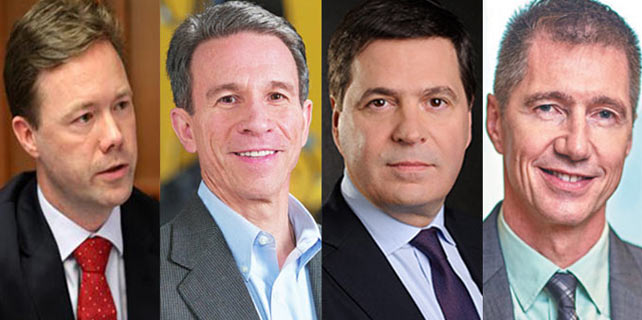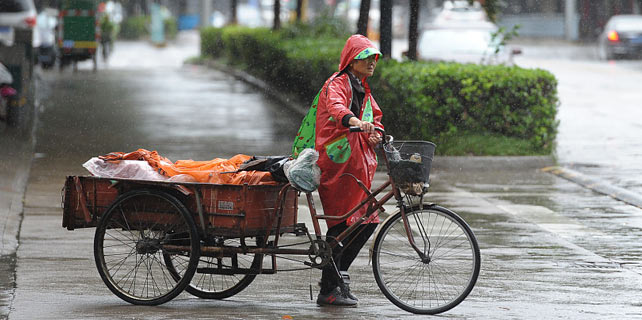Fight against graft, luxury will continue
Further refinement of effort expected at upcoming CPC National Congress
During the eight-day National Day holiday this month, a onetime imperial garden in downtown Beijing's Beihai Park received numerous visitors from home and abroad.
"I've been to the park many times before, but it's my first time to see the garden," said Zhang Xi, a middle-aged visitor.
"It was not easy to enter the garden before because it had been occupied by a luxury restaurant that provided services for only a very small group of people," the Beijing resident said.
Yilan Hall, which was used for reading by Emperor Qianlong, an 18th-century ruler of the Qing Dynasty (1644-1911), was open to the public in May after the Fangshan restaurant, which had first occupied the space in the late 1950s, moved out.
The change offers a glimpse into changes brought by the austerity campaign pushed in the past five years by the Communist Party of China, led by General Secretary of the CPC Central Committee Xi Jinping.
Fighting corruption and tightening self-supervision to rule out luxurious lifestyles and excess bureaucracy on the part of officials have been priorities of the Party since the 18th CPC National Congress in late 2012.
"Our Party faces many severe challenges, and there are also many pressing problems within the Party that need to be resolved, particularly corruption, taking bribes, being divorced from the people, going through formalities and bureaucracy caused by some Party officials," Xi told reporters on Nov 15, 2012, the day the new leadership was elected.
"We must make every effort to solve these problems. The whole Party must stay on full alert," he said.
On Dec 4 of that year, the CPC released its "eight-point rules", requiring officials to strictly practice frugality and clean up undesirable work styles such as formalism, bureaucratization, hedonism and extravagance. Practices such as the use of public funds to buy gifts, hold banquets and pay for holidays have since been strictly banned.
The rules have fundamentally changed the work style and lifestyle of many. By the end of this July, about 244,000 Party members, most of whom are officials at different levels, had received discipline or administrative penalties for breaking the "eight-point rules", according to the Central Commission for Discipline Inspection, the Party's top discipline watchdog.
Everyone is equal before Party rules and laws, no matter how high level he or she may be. In five years, more than 280 centrally administered officials, most of whom were at or above ministerial level, have been investigated by the CCDI, including Zhou Yongkang, Bo Xilai, Guo Boxiong, Xu Caihou, Sun Zhengcai and Ling Jihua. Among them, at least 120 have been transferred to judicial authorities to face justice, according to the CCDI.
To bring corrupt officials who have fled overseas back to face justice, China has heightened its cooperation with the international community.
By the end of August, 3,339 fugitives had returned to the Chinese mainland from more than 90 countries and regions, with 628 of them being former officials. About 9.36 billion yuan ($1.41 billion) was recovered, CCDI figures show.
Among China's top 100 most-wanted fugitives listed on Interpol red notices, the closest thing to an international arrest warrant, 48 have returned.
"These efforts have helped the Party gain crushing momentum in its anti-corruption fight and won public applause," said Xin Ming, a professor at the Party School of the Central Committee of the CPC.
A National Bureau of Statistics report shows that about 93 percent of the Chinese public were satisfied with the Party's anti-graft campaign last year, up from the 75 percent in 2012.
"The biggest problem that threatens the ruling foundation of the CPC has been resolved," Xin said, adding that the CPC must be strong itself in order to better lead the country and realize the great rejuvenation of the Chinese nation.
In light of these achievements, the central leadership retains a sober mind. In a key speech made on July 26, Xi said that although the public has spoken highly of the Party's strict self-discipline efforts, fighting graft and tightening inner-Party supervision will always continue.
"We should in no way feel complacent or blindly optimistic," he said. "To govern the Party strictly in all aspects, we still have a long way to go."
Yang Xiaodu, minister of supervision and deputy head of the CCDI, said in August that the "crushing momentum" against corruption needs to be further consolidated, and the self-supervision of the Party will be further improved.
Experts said they are looking forward to the CPC's 19th National Congress, which will start on Wednesday, as the congress is expected to continue the Party's anti-corruption drive.
"For the next five years, the CPC will continue its efforts in anti-corruption while attaching equal or more importance to preventing the emergence of corruption," Xin said.
Yang Yongchun, vice-president of China Against Corruption Law Association, said that more practical measures are expected, such as the formal establishment of a supervisory commission.
The new institution would integrate separate and less effective corruption control authorities, for instance, in a move to ensure the Party is fully supervised, he said.
A comprehensive system against corruption, including inspection, supervision and accountability sections, is also expected to be further improved, he added.
By the end of 2016, the country had more than 89 million Party members, 688,000 more than in 2015, while the figure for grassroots organizations exceeded 4.51 million, 105,000 more than in 2015, according to official Party figures.









